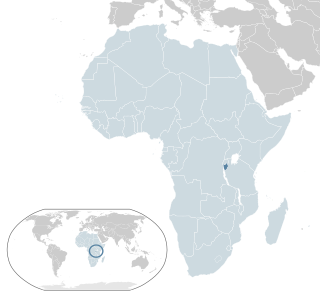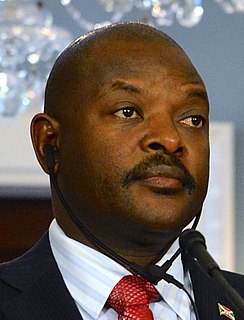
Politics of Burundi takes place in a framework of a transitional presidential representative democratic republic, whereby the President of Burundi is both head of state and head of government, and of a multi-party system. Executive power is exercised by the government. Legislative power is vested in both the government and the two chambers of parliament, the Senate and the National Assembly.

The National Defence Force is the state military organisation responsible for the defence of Burundi.

Burundi is one of the few countries in Africa, along with its closely linked neighbour Rwanda among others, to be a direct territorial continuation of a pre-colonial era African state.
Domitien Ndayizeye is a Burundian politician who was President of Burundi from 2003 to 2005. He succeeded Pierre Buyoya, as president on 30 April 2003, after serving as Buyoya's vice president for 18 months. Ndayizeye remained in office until succeeded by Pierre Nkurunziza on 26 August 2005.

The Burundian Civil War was an armed conflict lasting from 1993 to 2005. The civil war was the result of long standing ethnic divisions between the Hutu and the Tutsi ethnic groups in Burundi. The conflict began following the first multi-party elections in the country since independence from Belgium in 1962, and is seen as formally ending with the swearing in of Pierre Nkurunziza in August 2005. Children were widely used by both sides in the war. The estimated death toll stands at 300,000.

The National Liberation Front is an ethnically Hutu political party in Burundi that was formerly active as militant rebel group before and during the Burundian Civil War.

A constitutional referendum was held in Egypt on 26 March 2007. The amendments to the constitution were mostly concerning electoral law, and had been passed by Parliament on 20 March 2007. Government critics accused President Hosni Mubarak of deliberately having hastened the schedule in order to make it impossible for them to organise a strong "no" campaign.

The Constitution of Burundi was adopted by referendum on February 28, 2005 and promulgated on March 18, 2005.

A constitutional referendum was held in Kenya on 4 August 2010. Voters were asked whether they approved of a proposed new constitution, which had been passed by the National Assembly on 1 April 2010. The new constitution was seen as a vital step to avoid a repetition of the violent outbursts after the 2007 general elections.

Parliamentary elections were held in Burundi on 29 June 2015. The vote had been initially set for 5 June 2015, alongside local elections, but it was delayed due to unrest. Indirect elections to the Senate occurred on 24 July.

Presidential elections were held in Burundi on 21 July 2015. President Pierre Nkurunziza ran for a third term despite controversy over whether he was eligible to run again. The opposition boycotted the vote, and Nkurunziza won re-election.

On 25 April 2015, the ruling political party in Burundi, the National Council for the Defense of Democracy – Forces for the Defense of Democracy (CNDD-FDD), announced that the incumbent President of Burundi, Pierre Nkurunziza, would run for a third term in the 2015 presidential election. The announcement sparked protests by those opposed to Nkurunziza seeking a third term in office.

On 13 May 2015, army general Godefroid Niyombare said that he was "dismissing President Pierre Nkurunziza" following the 2015 Burundian unrest. However, the presidency tweeted that the "situation is under control" and there is "no coup".
Godefroid Niyombare is a Burundian military officer who led a coup attempt against President Pierre Nkurunziza on 13 May 2015. At the time of the coup attempt, Niyombare was a Major General. He previously served as military chief of staff and as Burundi's Ambassador to Kenya, and he was head of the National Intelligence Service from December 2014, when he replaced Adolphe Nshimirimana, until February 2015, when he was dismissed by Nkurunziza and replaced by Major-General Moïse Pasteur Bucumi.
Pontien Gaciyubwenge is a Burundian politician and soldier. He served as Minister of National Defence in the government of President Pierre Nkurunziza until he was fired on 18 May 2015, after a failed coup d'état.

The Thirty-sixth Amendment of the Constitution of Ireland is an amendment to the constitution of Ireland which permits the Oireachtas to legislate for abortion. The constitution had previously prohibited abortion unless there was a serious risk to the life of the mother.
The Arusha Peace and Reconciliation Agreement, widely known as the Arusha Accords, was a transitional peace treaty which brought the Burundian Civil War to an end. The agreement, negotiated in Arusha, Tanzania under the mediation of former Tanzanian president Julius Nyerere, were signed on 28 August 2000.
The National Intelligence Service is the state intelligence agency of Burundi. The SNR is headed by a general administrator who reports directly to the President of Burundi, while its individual agents report both to the SNR hierarchy and the public prosecutor. It runs its own detention facilities and is separate from the National Police of Burundi (PNB) and the National Defence Force (FDN).













